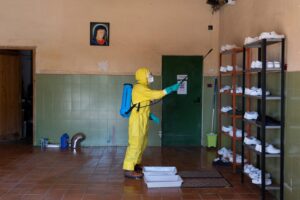
Textile Sector May Lose 50% Of Its Employment In 2021
Covid-19 is sinking the Spanish textile sector, one of the most dynamic sectors of the national economy until the pandemic, which threatens to destroy 50% of employment this year (100,000 jobs) and 50% of companies in some weeks. This is stated by both the president of the Acotex employer, Eduardo Zamácola, and the business consultancy Dipcom Corporate.
Specifically, according to the president of Acotex, half of the textile and accessories trade that was registered before the pandemic will close before mid-March, which would mean an additional 25% to the bankruptcies already consummated in 2020.
Sales fell 53% in January due to Covid and Filomena
The Business Association of Textile, Accessories and Leather Trade (Acotex) reported that sales of textile, home and accessories garments fell by 53.2% in January compared to the same month in 2020. The restrictions due to the third wave of the coronavirus and the storm Filomena left the sales without effect, which is the period when commerce makes cash.
A person advances on the snow this Saturday in Madrid.A person walks on the snow in Madrid.EFE
Destruction of 100,000 jobs
According to data from Dipcom Corporate, the sector could end 2021 with just 100,000 textile jobs, compared to 200,000 at the beginning of 2020.
The consulting firm, however, figures the reduction of companies in the sector at a third. about 17,000 out of a total of 51,000 registered at the end of 2019.
In any case, it is a dramatic destruction of companies and jobs, due to the lack of clients and the economic losses that have been dragging on since the pandemic began. Not surprisingly, according to the consultancy, in 2020 we have the income of the firms in the sector have been reduced by 40% in physical stores and 25% in the turnover as a whole.
Crisis that dragged from before Covid-19
“Textiles have been in crisis for several years in our country and the pandemic has exacerbated the difficult situation that Dolores Promesas, Tuc-túc or Pili Carrera were already going through,” explains Igor Ochoa, CEO of Dipcom Corporate.
Wedding and event restrictions and reduction. They say ‘I do’ on the terrace after postponing their wedding the coronavirusThey say ‘I do’ on the terrace after postponing their wedding the coronavirusEuropa Press.
To the direct restrictions on activity due to the pandemic, we must add other additional factors that have caused this fall, such as the reduction to a minimum of events, parties and weddings, or inclement weather such as the storm Filomena, which have caused dent in the sales.
“In this scenario, brands with physical stores, which were already affected by a high debt, have succumbed and investment funds and business groups are looking for opportunities to acquire them and regroup large companies in the Spanish sector,” they point out from Dipcom Corporate.
Restructuring and concentration in the sector
Dipcom Corporate’s forecast is that “from the second semester of next year we will begin to see a restructuring of the sector in which a high number of purchases will take place and will be distributed among large players, some medium-sized companies and a reduced number of small companies. ”. Igor Ochoa also points out that it will not be until 2022 when textile companies experience a slight recovery.
Valencian Community, Extremadura and the Canary Islands, the most affected. If we look at the impact of the crisis on the textile sector in Spain and according to data from the National Institute of Statistics (INE), the communities most affected by the loss of textile companies have been Extremadura, the Valencian Community and the Canary Islands.
On the other hand, Cantabria, Navarra and Catalonia are located, which are the communities in which fewer companies linked to the sector have been forced to close their doors.
Urgent direct aid and cancellation of taxes and fees
The employer association Acotex calls for “urgent and specific” measures for the sector and highlights that “it is necessary to waive taxes, fees and taxes, the exemption of Social Security contributions or a reduction of VAT to encourage consumption”, among others issues.
The association also asks for a solution for the payment of commercial rents which, it assures, they cannot cope with.


